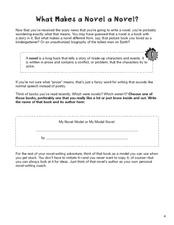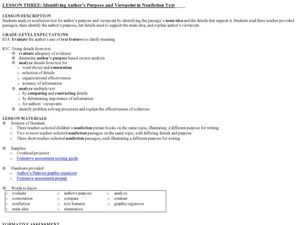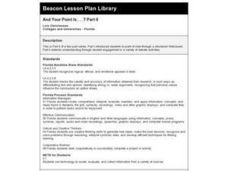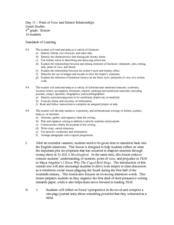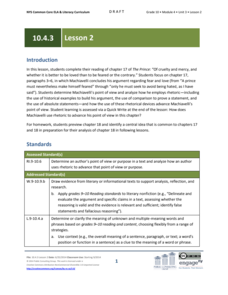Curated OER
What Makes a Novel a Novel?
As your authors prepare to write a hypothetical novel, they need all the inspiration they can find! Using a book they have already read (and enjoyed), learners complete a literary analysis by filling in eight short-answer questions....
English Linx
Points of View Worksheet
Put your learners' skills in identifying point of view to the test (or just practice) with an activity that has them identify the point of view in a story by giving three textual examples. The directions are clear and examples of first...
Curated OER
Identifying Author’s Purpose and Viewpoint in Nonfiction Text
Why do people write books? Pupils discover how to identify the author's viewpoint. They read non-fiction passages their instructor selects (the plan has the class look at nonfiction children's picture books), and then identify the...
EngageNY
TASC Transition Curriculum: Workshop 12
How can opinions slant facts? Workshop participants learn how to examine primary and secondary sources and identify the author's point of view. They also examine how visual art impacts the meaning and rhetoric of sources. Full of...
Curated OER
And Your Point Is . . .? Part II
After researching recent community or political issues, paired with a review of proper debate format, class members select a topic, adopt a side, and prepare for a debate. The value in this resource is the review of debate procedures,...
EngageNY
Analyzing the Author’s Perspective: “Equal Rights for Women” by Shirley Chisholm
It's all about perspective. Scholars talk about the meaning of perspective and look closely at the point of view of Equal Rights for Women. They discuss how Chisholm addresses the views of others and complete a close reading guide to...
Idaho State Department of Education
Lessons for Social Studies Educators
Point of view, purpose, and tone: three concepts readers of primary and secondary source materials must take into account when examining documents. Class members view a PowerPoint presentation and use the SOAPS strategy to identify an...
Curated OER
Author's Purpose and Point of View Post Test
For this author's purpose and point of view worksheet, students determine the definition of the terms and identify the author's purpose and point of view in given passages.
Curated OER
Literary Element: Point of View
In this literacy worksheet, pupils focus upon the element of literature know as the point of view. They use the story and discuss the first and third person context.
Curated OER
Point of View and Mentor Relationships
Tenth graders analyze the role of mentors, point of view, and prejudice using the texts of To Kill a Mockingbird and Maya Angelou's I Know Why the Caged Bird Sings. For this literature analysis lesson, 10th graders review Scout's...
Curated OER
Evaluating Information Quality
Students evaluate information they are given and identify the quality of the information as fact, fiction, and point of view. In this information quality lesson plan, students also discuss how they can pick out good information verses...
PB Works
The Cay by Theodore Taylor
Record the plot elements of The Cay on this activity. Pupils note basic information about the book and answer questions about the introduction, point of view, character, conflict, rising action, climax, falling action, and resolution of...
Curated OER
Lesson Plan 2: So What's a Novel, Anyway?
What makes a novel a novel? Class members select a favorite novel, record their impressions on a worksheet, and then come together in groups to discuss the elements common to narrative writing. Next, they identify the characters, the...
Curated OER
Frankenstein
Share a classic novel with your class using this resource. After reading Frankenstein by Mary Shelley, learners answer questions involving the narrator's point of view, make and confirm predictions, and sequence events in the story.
Teaching Tolerance
Using Photographs to Teach Social Justice | Confronting Unjust Laws
The right to peacefully assembly to protest injustice is a key element of the First Amendment to the United States Constitution. Class members are asked to analyze two photographs of people confronting what they consider to be unjust...
EngageNY
Grade 10 ELA Module 4: Unit 3, Lesson 2
How do rhetorical devices advance an author's point of view? Scholars consider this question as they continue exploring Machiavelli's The Prince. They work in small groups, annotating the text for evidence of rhetoric before engaging in...
EngageNY
Analyzing the Author’s Perspective: “The Shakespeare Shakedown”
Simon Schama's article "The Shakespeare Shakedown" allows young writers to see how authors respond to conflicting viewpoints. Class members participate in discussion appointments with five peers to explore the author's point of view.
Maryland Department of Education
The Concept of Diversity in World Literature Lesson 12: Author's Purpose - Yeats and Achebe
Is there such a thing as fate/luck? Can one fight destiny? As part of their study of Chinua Achebe's purpose in writing Things Fall Apart, class members answer these questions from Achebe's point of view and then from William Butler...
Curated OER
Neighborhood or Slum? Snapshots of Five Points: 1827-1867
How has your local neighborhood changed throughout recent history? Young researchers evaluate census data, images, and primary source descriptions describing the living situation in the antebellum Five Points neighborhood. They consider...
Waunakee Community School District
Identifying Themes in Literature
If your language arts learners have a hard time determining the universal theme of a written work, use a straightforward worksheet to help them find it. After reviewing a list of common themes, kids note the title, character, plot, point...
Curated OER
"I" Witness to History
Young journalists write diary entries from the point of view of a person involved in a historical event. They focus on including facts, clear narration, and accurate description of the individual's feelings.
Curated OER
Pet Perspective
Discuss point of view through a familiar medium: your pet! Learners write a story from the perspective of their own or the class pet. Prompts such as "My Family" (or "My Class"), "My Day," and "A Day in the Life of a _________" help...
Curated OER
Stephen Crane's "The Open Boat"
Learners examine the relationship of man and nature as portrayed in Stephen Crane's, The Open Boat." The third person, omniscient point of view, the depth of character analysis found in the story, and the emotions evoked by the author...
Curated OER
The Jacket: Journal Templates Teacher's Guide
Explore this story involving prejudice and racism to enhance learners' comprehension skills. The story The Jacket by Andrew Clements involves an African American boy who is falsely accused of stealing someone's jacket. This teacher's...
Other popular searches
- Author's Point of View Media
- Authors Point of View Media
- Authors View Point
- Author's View Point
- Author's "Point of View" Media


